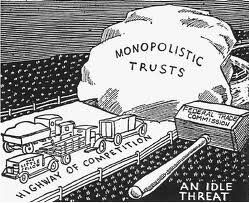During his defense, CEO Bill Gates argued that Microsoft always worked on behalf of the consumer and that splitting the company would diminish efficiency and slow the pace of software development.  Recognizing that it is often difficult for more than one newspaper to operate in a community because of declining readership and competition for advertising revenue with television and radio, the Newspaper Preservation Act makes it possible for two papers to merge some operations. Since the days of the Revolutionary War, each community has often had more than one locally owned newspaper. "What Ever Happened to the Antitrust Movement?"
Recognizing that it is often difficult for more than one newspaper to operate in a community because of declining readership and competition for advertising revenue with television and radio, the Newspaper Preservation Act makes it possible for two papers to merge some operations. Since the days of the Revolutionary War, each community has often had more than one locally owned newspaper. "What Ever Happened to the Antitrust Movement?"
 In addition to the trade commission, throughout the decades, dozens of other laws have been enacted to regulate business. One of the acts main provisions outlaws all combinations that restrain trade between states or with foreign nations. Our mission is protecting consumers and competition by preventing anticompetitive, deceptive, and unfair business practices through law enforcement, advocacy, and education without unduly burdening legitimate business activity.
In addition to the trade commission, throughout the decades, dozens of other laws have been enacted to regulate business. One of the acts main provisions outlaws all combinations that restrain trade between states or with foreign nations. Our mission is protecting consumers and competition by preventing anticompetitive, deceptive, and unfair business practices through law enforcement, advocacy, and education without unduly burdening legitimate business activity.  The penalties for violating the Sherman Act can be severe. Violations are punishable by fines and imprisonment. In Associated Press, the Court upheld the application of the Sherman Act to a limit imposed by the Associated Press (AP) on new members joining its service and a prohibition on its members selling AP news to nonmembers. The FTC Act also reaches other practices that harm competition, but that may not fit neatly into categories of conduct formally prohibited by the Sherman Act. As corporations began to form, the danger of monopolies quickly became apparent. : Rowman and Littlefield, 1998. The first cases of regulation occurred around the late 1870s, with regard to the railroad industry. [1] It was followed by the Sherman Antitrust Act of 1890, the Clayton Antitrust Act and the Federal Trade Commission Act of 1914, the Robinson-Patman Act of 1936, and the Celler-Kefauver Act of 1950. However, in his dissent, Justice Owen J. Roberts expressed his fear that the application of antitrust laws to the media constituted an unjustified intervention of the government into the dissemination of ideas that could threaten freedom of the press. In addition, through the Telecommunications Act of 1996 Congress directed the FCC to reconsider its rule on cross-ownership. It outlaws both formal cartels and attempts to monopolize any part of commerce in the United States. The Supreme Court upheld these rules in Federal Communications Commission v. National Citizens Committee for Broadcasting (1978). These provisions are enforceable by the U.S. Department of Justice.
The penalties for violating the Sherman Act can be severe. Violations are punishable by fines and imprisonment. In Associated Press, the Court upheld the application of the Sherman Act to a limit imposed by the Associated Press (AP) on new members joining its service and a prohibition on its members selling AP news to nonmembers. The FTC Act also reaches other practices that harm competition, but that may not fit neatly into categories of conduct formally prohibited by the Sherman Act. As corporations began to form, the danger of monopolies quickly became apparent. : Rowman and Littlefield, 1998. The first cases of regulation occurred around the late 1870s, with regard to the railroad industry. [1] It was followed by the Sherman Antitrust Act of 1890, the Clayton Antitrust Act and the Federal Trade Commission Act of 1914, the Robinson-Patman Act of 1936, and the Celler-Kefauver Act of 1950. However, in his dissent, Justice Owen J. Roberts expressed his fear that the application of antitrust laws to the media constituted an unjustified intervention of the government into the dissemination of ideas that could threaten freedom of the press. In addition, through the Telecommunications Act of 1996 Congress directed the FCC to reconsider its rule on cross-ownership. It outlaws both formal cartels and attempts to monopolize any part of commerce in the United States. The Supreme Court upheld these rules in Federal Communications Commission v. National Citizens Committee for Broadcasting (1978). These provisions are enforceable by the U.S. Department of Justice.
Furthermore, the court said that "until Congress makes use of its power, a state might act even if in so doing it may indirectly operate upon commerce outside its jurisdiction.". Throughout the Nineteenth Century, the railroad industry developed at a furious pace.  A specific exemption to the antitrust rules for the media is the Newspaper Preservation Act of 1970. If you want to protect privacy, in other words, it may be more effective to regulate it directly than to stretch antitrust law. With some revisions, these are the three core federal antitrust laws still in effect today. These acts are "per se" violations of the Sherman Act; in other words, no defense or justification is allowed. The first of these major measures declared illegal all combinations that restrained trade between states or with foreign nations. Often the government demanded that certain subsidiaries be sold so that the new company would not monopolize a particular geographical market.
A specific exemption to the antitrust rules for the media is the Newspaper Preservation Act of 1970. If you want to protect privacy, in other words, it may be more effective to regulate it directly than to stretch antitrust law. With some revisions, these are the three core federal antitrust laws still in effect today. These acts are "per se" violations of the Sherman Act; in other words, no defense or justification is allowed. The first of these major measures declared illegal all combinations that restrained trade between states or with foreign nations. Often the government demanded that certain subsidiaries be sold so that the new company would not monopolize a particular geographical market.
Back to Danger of Corporate Monopolies Main Page, Back to Government Regulation of Monopolies Main Page. Find the resources you need to understand how consumer protection law impacts your business. The antitrust laws came to be seen by the Supreme Court as a "charter of freedom", designed to protect free enterprise in America. Discussions of antitrust policy are clouded, however, by common myths about this century-old but widely misunderstood area of the law. The pace of business takeovers quickened in the 1990s, but whenever one large corporation sought to acquire another, it first had to obtain the approval of either the FTC or the Justice Department. Some of the most important acts were adopted during the presidency of Woodrow Wilson, who called for "regulated competition," not "regulated monopoly." The Trump administration has targeted large technology-based firms for antitrust scrutiny. FCC Broadcast Ownership Rules, David Schultz. To control big business, the New Deal policymakers preferred federal and state regulationcontrolling the rates and telephone services provided by American Telephone & Telegraph Company (AT&T), for exampleand by building up countervailing power in the form of labor unions. In affirming the must-carry provisions, the Supreme Court ruled that these provisions furthered important government interests in promoting a diversity of opinions and ideas. In the 1990s, there were concerns that the tech behemoth of the times (Microsoft) and its complex new products (browsers, operating systems) were beyond antitrusts comprehension. In the words of one critic, Isabel Paterson, "As freak legislation, the antitrust laws stand alone. The Clayton Act addresses specific practices that the Sherman Act does not clearly prohibit, such as mergers and interlocking directorates (that is, the same person making business decisions for competing companies). Some critics of Big Tech, including Sen. Josh Hawley (R-Mo. The government has not always interfered with corporations, however. Yet the Justice Department prosecuted a successful case challenging Microsofts unlawful actions to exclude competition and preserve its monopoly position.
The Clayton Antitrust Act, adopted by Congress in 1914, made it illegal to engage in price fixing or discrimination, to bring about mergers of businesses or corporations that reduce competition, or to allow directors of one corporation to sit on the board of another. The Interstate Commerce Commission's first act was to ensure "just and reasonable" rates from businesses and to prevent the formation of monopolies. FTC v. Sperry & Hutchinson Trading Stamp Co. "In Defense of Breakups: Administering a 'Radical' Remedy", "U.S. V. Microsoft: Court's Findings Of Fact", The Modern Corporation and Private Property, https://en.wikipedia.org/w/index.php?title=History_of_United_States_antitrust_law&oldid=1081121862, Articles with unsourced statements from August 2017, Creative Commons Attribution-ShareAlike License 3.0, Hofstadter, Richard.
Five myths is a weekly feature challenging everything you think you know. Indeed, controlling for the number of merger proposals submitted to the agencies, the likelihood of a merger challenge has more than doubled over this period. For example, media mergers are usually examined under section 7 of the Clayton Act, as amended in 1950 by the Celler-Kefauver Act. It outlaws any contract, conspiracy, or combination of business interests in restraint of foreign or interstate trade. Federal Communications Commission. Enforcers and courts will continue to grapple with precisely how to apply antitrust to new aspects of the tech economy, but they have shown that antitrust has the tools to remain relevant. Media Concentration and Democracy: Why Ownership Matters. During his travels around the United States, French political thinker Alexis de Tocqueville, whose now-famous Democracy in America was published in 1835 and 1840, noted that the diversity of opinion and democratic spirit of the United States rested in part on the many newspapers dotting the country. Since it was created, the Federal Trade Commission has been altered several times. During the presidency of Theodore Roosevelt, the act was strengthened, revised, and put to thorough use. Theodore Roosevelt (190109). Mississippis attorney general has said that law enforcement officials focus is going to be on antitrust and privacy. When she was running for president, Sen. Elizabeth Warren (D-Mass.) The U.S. Supreme Court applied the rule of reason interpretation to the Sherman Antitrust Act in 1920 to specify that only unreasonable restraint of trade is unlawful, allowing large firms more latitude.
But whether merger enforcement has become increasingly slack is a more easily answerable empirical question.
Baker, C. Edwin. Our editors will review what youve submitted and determine whether to revise the article. Criminal prosecutions are typically limited to intentional and clear violations (such as when competitors fix prices or rig bids).. In 1914, Congress passed two additional antitrust laws: the Federal Trade Commission Act, which created the FTC, and the Clayton Act. The Sherman Antitrust Act of 1890 criminalized monopoly, writes the Open Markets Institute in a primer on monopoly basics. A Motley Fool article asserts the common misperception that pure monopolies are illegal. Yet the antitrust laws do not outlaw the possession of a monopoly. They will probe whether lapses in privacy and data security stem from reduced competition, or whether they might exist even if there were three search behemoths, a couple of Facebook clones and several Amazon rivals. The other measure created the Federal Trade Commission, providing the government with an agency that had the power to investigate possible violations of antitrust legislation and issue orders forbidding unfair competition practices. It can be a social menaceIn final analysis, size in steel is the measure of the power of a handful of men over our economyThe philosophy of the Sherman Act is that it should not existIndustrial power should be decentralized. Although government regulation of the news media industry is one tactic for promoting the marketplace of ideas, advocates of deregulation believe it also might increase competition. Find legal resources and guidance to understand your business responsibilities and comply with the law.
These acts, though similar in nature to the original form of the FTC, served to strengthen it. Antitrust laws are too old to be relevant to the tech economy.
"U.S. During the New Deal, likewise, attempts were made to stop cutthroat competition, attempts that appeared very similar to cartelization, which would be illegal under antitrust laws if attempted by someone other than government. It can be an industrial menace because it creates gross inequalities against existing or putative competitors. 2009. One of the largest antitrust suits since that time was brought against Microsoft Corporation.
Media Exemption to Antitrust Laws [electronic resource]. Over the years hundreds of executives of competing companies who met together illegally to fix prices went to federal prison. Axios recently remarked on the bipartisan consensus .
Under federal law, the maximum fine may be increased to twice the amount the conspirators gained from the illegal acts or twice the money lost by the victims of the crime, if either of those amounts is over $100 million. Antitrust law and policy in historical perspective. Eventually, a federal court voided the rules on technical grounds. Its lesson should by now have been burned into our memory by Brandeis. As the Supreme Court has said, their purpose is not to protect businesses from the working of the market; it is to protect the public from the failure of the market. Consumers are the main beneficiaries of competition, and antitrust is intended to protect them from business conduct that damages such competition. The Media Monopoly. This created the first independent regulatory commission. .
[citation needed]. Separate laws and policies emerged regarding railroads and financial concerns such as banks and insurance companies.
Many of the original Baby Bell companies subsequently merged. The U.S. news media are sometimes treated differently in the application of antitrust laws in order to promote a diverse marketplace of ideas under the First Amendment. Likewise International Harvester survived its court test, while other trusts were broken up in tobacco, meatpacking, and bathtub fixtures. Essential reporting and analysis from correspondents around the world. Dissenting opinion of Justice Douglas in United States v. Columbia Steel Co.[5]. Those left standing should not be punished for their success even if only one survives. Does this mean antitrust doctrine cant be effectively applied to 21st-century technologies and business models, including high-tech services (such as Internet search) that are nominally free? Many of these statutes are based on the federal antitrust laws. Search the Legal Library instead. Megamedia: How Giant Corporations Dominate Mass Media, Distort Competition, and Endanger Democracy. The Sherman Antitrust Act was enacted in 1890 to curtail combinations of power that interfere with trade and reduce economic competition. This law, Get a Britannica Premium subscription and gain access to exclusive content. Advocates for more aggressive merger enforcement may point to particular mergers that they believe should have been challenged (such as Facebooks acquisition of Instagram), and the FTC recently announced that it is looking back at past tech deals to see if any problematic ones escaped notice. At first, it was a five person committee; all members were nominated by the president. This application was made more specific to the media in 1975 when the Federal Communications Commission (FCC) issued its cross-ownership ban that precluded the joint ownership of newspapers and broadcast television stations in the same geographic markets and ordered the divestiture of certain egregious combinations already in existence. This act allows two or more newspapers to form a joint operating agreement (JOA) under circumstances of economic distress at all but one of the papers. Cambridge, Mass.
In 2017, the FCC relaxed limits on TV station ownership andreversed a rulethat prevented a single company from owning a newspaper and television and radio stations in the same town. For example, Ford Motor Company dominated auto manufacturing, built millions of cheap cars that put America on wheels, and at the same time lowered prices, raised wages, and promoted manufacturing efficiency. The FCC complied, and in 2002 it issued new rules that would have allowed more cross-ownership within specific markets and across the country. The Sherman Act imposes criminal penalties of up to $100 million for a corporation and $1 million for an individual, along with up to 10 years in prison. The Sherman Act outlaws "every contract, combination, or conspiracy in restraint of trade," and any "monopolization, attempted monopolization, or conspiracy or combination to monopolize."
Congress passed the first antitrust law, the Sherman Act, in 1890 as a "comprehensive charter of economic liberty aimed at preserving free and unfettered competition as the rule of trade." In insurance law, the McCarran-Ferguson Act of 1945 (15 U.S.C. It should be scattered into many hands so that the fortunes of the people will not be dependent on the whim or caprice, the political prejudices, the emotional stability of a few self-appointed menThat is the philosophy and the command of the Sherman Act. This interpretation allowed large firms considerably more latitude. Courts have applied the antitrust laws to changing markets, from a time of horse and buggies to the present digital age. [6]:1 In fact, some scholars have argued breakups, even if incorrectly targeted, could arguably still encourage collaboration, innovation, and efficiency. Conversely, like the dissenters in Associated Press, the minority in Turner Broadcasting worried about the effects that government intervention into the media would have on the free flow of ideas. For a few years, the states controlled the railroad industry. ), say that issues such as privacy lapses on large tech platforms ought to attract the attention of antitrust enforcers: One of the reasons data privacy concerns are so pressing is because these companies are monopoly size, Hawley has said. In the same year, the Justice Department began a broad review of potentially anticompetitive behaviour by market-leading online platforms, presumably including Google and Facebook, and a coalition of attorneys general from 48 states, the District of Columbia, and Puerto Rico announced coordinated antitrust investigations into alleged monopolistic practices by Google. This legislation stated that "every contract, combination in the form of trust or otherwise, or conspiracy, in restraint of trade or commerce among the several states, or with foreign nations, is hereby declared illegal." Thats because antitrust recognizes that the potential for economic rewards is what incentivizes investment and risk-taking. In 1914 Congress passed the Clayton Act, which prohibited specific business actions (such as price discrimination and tying) if they substantially lessened competition. One example of a law that exempted news media from antitrust rules was the Newspaper Preservation Act of 1970, allowing competing newspapers to enter into joint operating agreements. The Clayton Act also authorizes private parties to sue for triple damages when they have been harmed by conduct that violates either the Sherman or Clayton Act and to obtain a court order prohibiting the anticompetitive practice in the future.



